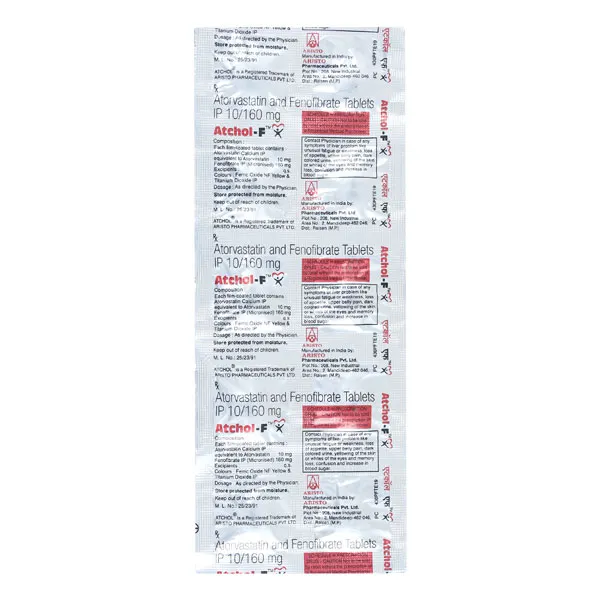Atchol F Tablet is a combination medicine used to lower high cholesterol and triglyceride levels in the blood. It belongs to a group of medications known as lipid-lowering agents. This tablet is typically prescribed when lifestyle changes like a low-fat diet, regular exercise, and weight management alone are not enough to control lipid levels. By effectively reducing harmful fats in the blood, Atchol-F helps in preventing serious heart-related complications, including heart attacks and strokes.
Although people with high cholesterol or triglycerides often feel completely normal, the risk of cardiovascular disease remains high if left untreated. Atchol-F Tablet helps bring these levels under control and supports long-term cardiovascular health. It should be taken regularly and consistently at the same time each day to maintain stable drug levels in the body. Along with medication, healthy lifestyle habits remain essential for optimal benefit.
 Uses
Uses
- Prevention of Heart attack
- Treatment of High cholesterol
Benefits of Atchol F
- Reduces LDL (“Bad”) Cholesterol
Atchol-F lowers levels of low-density lipoprotein (LDL), which is responsible for plaque buildup in the arteries, leading to narrowing and blockages. - Increases HDL (“Good”) Cholesterol
The medicine helps raise high-density lipoprotein (HDL) levels, which help remove harmful cholesterol from blood vessels. - Lowers Triglycerides
Atchol-F is effective in reducing triglyceride levels, another type of fat in the blood that increases the risk of heart disease. - Prevents Heart Attack and Stroke
By improving the lipid profile, the medicine reduces the risk of atherosclerosis, heart attacks, and strokes. - Supports Long-Term Heart Health
Continued use helps maintain healthier blood vessels and improves blood flow throughout the body.
 How Atchol F Tablet works
How Atchol F Tablet works
Atchol-F Tablet contains two active ingredients, both of which help lower blood lipid levels. One component belongs to the statin class, which works by blocking an enzyme (HMG-CoA reductase) responsible for cholesterol production in the liver. The other component is a fibrate, which primarily reduces triglyceride levels and may also increase HDL cholesterol. Together, they produce a synergistic effect in lowering total cholesterol, LDL, and triglycerides while increasing HDL levels. This combination therapy provides a more comprehensive approach to lipid management than either drug alone.
 Side effects
Side effects
- Nausea
- Stomach pain
- Constipation
- Flatulence
- Headache
- Muscle pain
- Increased liver enzymes
- Increased blood sugar
- Insomnia






